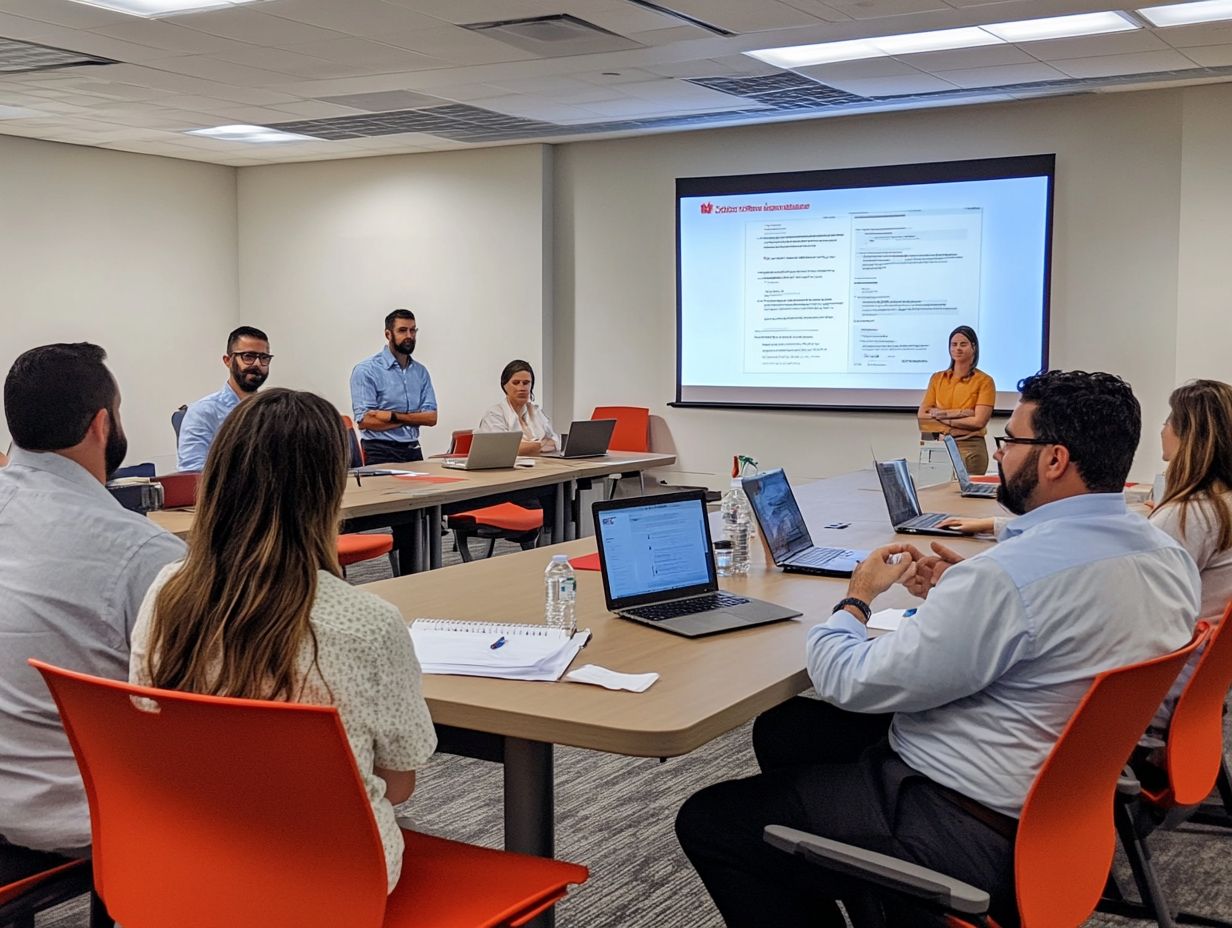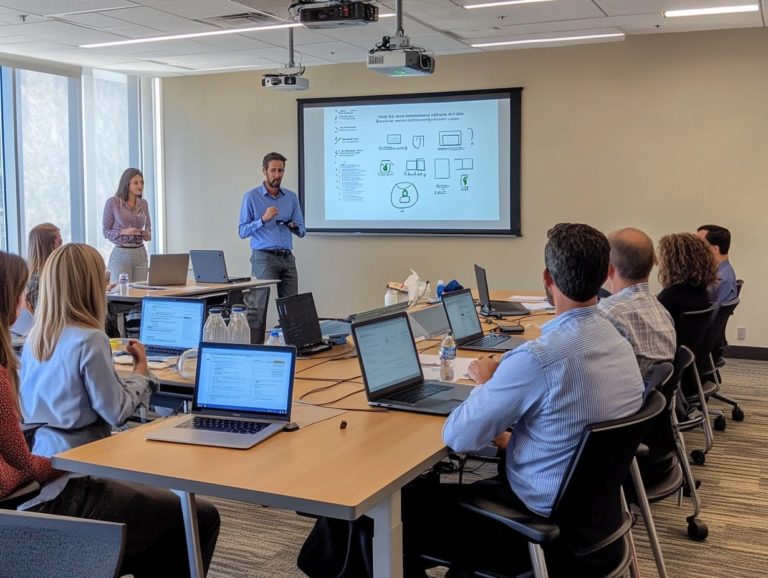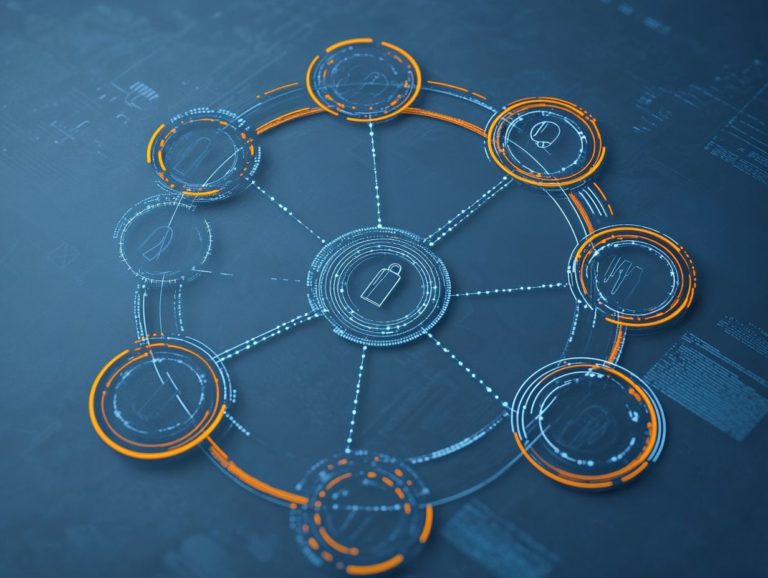5 essential cybersecurity skills for employees
In today s digital landscape, grasping the nuances of cybersecurity is essential for employees at every level. Cyber threats are in a constant state of evolution. Honing the skills needed to counter them is vital for fostering a secure work environment.
This article delves into five critical cybersecurity skills you should master. These range from spotting suspicious activities to crafting robust passwords and safeguarding your personal devices.
We will highlight the importance of ongoing training and vigilance in the ongoing battle against cyber attacks.
Act now to protect both your workplace and personal data! Continue reading to elevate your cybersecurity awareness and skills!
Contents
- Key Takeaways:
- 1. Understanding the Basics of Cybersecurity
- 2. Identifying and Reporting Suspicious Activities
- 3. Creating Strong and Unique Passwords
- 4. Securing Personal Devices
- 5. Staying Up-to-Date with Security Measures
- Why Are Cybersecurity Skills Important for Employees?
- What Are the Consequences of Not Having Adequate Cybersecurity Skills?
- What Are the Most Common Cybersecurity Threats Faced by Employees?
- How Can Employees Be Trained in Cybersecurity?
- What Are the Best Practices for Maintaining Cybersecurity in the Workplace?
- How Can Employees Stay Vigilant Against Cyber Attacks?
- Frequently Asked Questions
- What are the 5 essential cybersecurity skills for employees?
- Why are these skills important for employees to have?
- How can employees learn and develop these skills?
- Are these skills only important for IT professionals?
- Can employees without a technical background still acquire these skills?
- How can companies ensure that their employees possess these essential cybersecurity skills?
Key Takeaways:

- Understanding the basics of cybersecurity is crucial for all employees to protect themselves and their company’s data.
- Identifying and reporting suspicious activities can help prevent cyber attacks and protect sensitive information.
- Creating strong and unique passwords is your best defense against data breaches.
1. Understanding the Basics of Cybersecurity
Understanding the fundamentals of cybersecurity is absolutely essential. Cyberattacks can harm both people and businesses.
This foundational knowledge includes aspects such as information security, network security, system administration practices, and malware prevention. All of these are crucial for safeguarding sensitive data and maintaining system integrity.
By mastering these basics, you position yourself to effectively counter threats. You also contribute to a more secure digital environment.
Recognizing the different types of cyberattacks, such as phishing, ransomware, and denial of service attacks, enables you to implement targeted defenses tailored to specific threats.
System administration plays a pivotal role here. It involves maintaining systems, enforcing security protocols, and managing user access to minimize vulnerabilities.
Operating systems serve as critical components in these protective measures. They act as your first line of defense with features like firewalls and encryption.
Continuous learning is essential. It enables you to stay informed about emerging threats and adapt your strategies accordingly, ensuring robust protection in an ever-evolving digital landscape.
2. Identifying and Reporting Suspicious Activities
Identifying and reporting suspicious activities is a critical skill for you as a cybersecurity professional. Timely action can significantly mitigate potential security incidents and provide a robust defense against cyber threats.
In today’s digital landscape, recognizing early warning signs is essential. Look out for unusual account access patterns, unexpected spikes in network traffic, or the presence of unfamiliar devices.
For instance, if you notice a sudden surge in login attempts from an unrecognized location, it could signal a brute-force attack.
Risk management is pivotal in fortifying your defenses. It allows you to prioritize resources and responses based on their potential impact.
Establishing clear protocols for incident handling ensures that any detected anomalies are swiftly investigated. This includes immediate reporting channels and escalation steps.
By meticulously documenting these incidents, you not only address current threats but also bolster your future preventative strategies.
3. Creating Strong and Unique Passwords
Creating strong and unique passwords is your best defense against unauthorized access to your sensitive data and accounts. By employing a mix of uppercase letters, numbers, and special characters, you can ensure that your passwords are difficult for potential intruders to guess.
It’s crucial to use different passwords for various accounts. This strategy prevents a single breach from compromising multiple services, keeping your personal information safe.
Beyond strong passwords, encryption keys are vital in enhancing your security. They convert data into unreadable formats, effectively deterring unauthorized access.
When combined with these practices, cloud security solutions integrate various tools and protocols to bolster data protection. This offers you peace of mind in an increasingly digital world.
4. Securing Personal Devices

Securing your personal devices is crucial today. IoT devices and mobile technology are prime targets for cyberattacks.
With more connectivity comes a rise in malware infections and data breaches. It s imperative to adopt comprehensive security measures.
A wide array of security tools is available think antivirus software, firewalls, and intrusion detection systems. These can effectively shield your devices from potential threats.
By embracing best practices like regularly updating software, using strong passwords, and enabling two-factor authentication (a method that adds an extra layer of security by requiring a second form of verification), you can significantly reduce your vulnerabilities.
Understanding the specific security features of different operating systems is also essential. Each offers unique protections and settings that can enhance your device’s security.
Familiarize yourself with the security options available on your devices. This ensures your systems and applications are up-to-date and minimizes risks.
5. Staying Up-to-Date with Security Measures
Staying up-to-date with security measures is essential for your success in cybersecurity! It helps you combat emerging threats while ensuring compliance with evolving regulations.
This vigilance protects your systems and guarantees adherence to compliance laws, which are essential for maintaining trust and accountability. By understanding these regulations, you bolster your credibility and reduce the risk of costly breaches.
Acquiring industry certifications is pivotal for your professional development. These certifications offer structured learning paths that equip you with the latest skills and knowledge needed in today s dynamic environment.
Embracing lifelong learning is vital. It enables you to adapt to rapid technological advancements, ensuring your skills remain relevant and effective against future challenges.
Why Are Cybersecurity Skills Important for Employees?
Cybersecurity skills are increasingly vital for employees across diverse sectors. The demand for expertise is rising as cyber threats and security breaches proliferate.
Organizations recognize the essential need for robust defense mechanisms. By equipping employees with cybersecurity capabilities, you enhance workplace security and foster a culture of vigilance throughout the organization.
As cyberattacks evolve, professionals armed with these skills enjoy promising job prospects. Industry analysts predict a notable increase in available positions.
The average salary for cybersecurity roles is attractive, often ranging from $80,000 to over $150,000 annually, depending on experience and specialization.
Nurturing cybersecurity skills strengthens business resilience, enabling organizations to protect assets while swiftly adapting to emerging threats.
What Are the Consequences of Not Having Adequate Cybersecurity Skills?
The consequences of lacking adequate cybersecurity skills can be dire. They can lead to security incidents that jeopardize sensitive information and result in legal troubles due to non-compliance with regulations.
These incidents can cause massive financial losses that organizations cannot afford. Take the Equifax breach of 2017 as an example; it exposed the personal data of 147 million individuals and cost the company over $4 billion in expenses, including fines and legal fees.
The reputational damage from such breaches can linger, causing customers to lose trust and potentially take their business elsewhere.
Firms that fail to meet compliance standards may face legal challenges, complicating their operational landscape even further.
These scenarios highlight the urgent necessity for robust cybersecurity measures and ongoing training.
What Are the Most Common Cybersecurity Threats Faced by Employees?

Today, many cybersecurity threats exist. Prioritize malware prevention and recognize phishing attacks as important parts of a strong security plan.
These threats ransomware, data breaches, and social engineering scams are constantly changing. It’s essential for you and your colleagues to stay informed.
Take ransomware, for instance. It can encrypt your valuable company data and demand a substantial ransom for its release. Meanwhile, phishing attacks cleverly entice unsuspecting employees into revealing sensitive information.
Regular training sessions covering the latest scams and preventive measures are crucial. By practicing good password hygiene, exercising caution with suspicious emails, and utilizing two-factor authentication, which adds an extra layer of security by requiring two forms of identification before access, you can significantly reduce your defenses against potential cyber threats.
How Can Employees Be Trained in Cybersecurity?
Training employees in cybersecurity is paramount for cultivating a secure organizational culture. It equips them with the technical and soft skills they need to navigate the digital landscape with confidence.
You can enhance your training programs using a variety of methods, such as hands-on workshops, interactive online courses, and recognized industry certifications.
These initiatives focus not only on technical skills, like mastering specific cybersecurity tools, but also on essential soft skills, including effective communication and teamwork.
By nurturing an environment that promotes continuous training, your employees will stay informed about the latest threats. This ensures their skills evolve with changing technology.
This comprehensive approach ultimately enables individuals to respond swiftly to cyber challenges while fostering a culture of collaboration and resilience within your teams.
What Are the Best Practices for Maintaining Cybersecurity in the Workplace?
Implementing best practices for maintaining cybersecurity in your workplace requires a blend of effective risk management, solid incident handling protocols, and strong communication skills among your team members.
To build a robust cybersecurity framework, prioritize regular security audits and comprehensive risk assessments that identify vulnerabilities before they can be exploited.
Training programs for employees are essential in raising awareness about potential threats and promoting best security practices.
Fostering a culture that encourages open communication can significantly improve the chances of timely incident reporting. A proactive mindset speeds up response times and enables your employees to actively contribute to the organization s cybersecurity defenses. This creates a united front against potential cyber threats.
How Can Employees Stay Vigilant Against Cyber Attacks?
Staying vigilant against cyber attacks demands that you cultivate an analytical mindset and maintain a sharp eye for detail. This allows you to identify potential threats before they escalate.
This goes beyond merely recognizing suspicious emails or unexpected login attempts. It involves establishing a routine to regularly monitor sensitive information and system activities.
By understanding common cybersecurity threats, such as phishing scams or malware, you enable yourself to spot warning signs quickly.
Integrating vigilance into your daily tasks like routinely updating passwords and being cautious about sharing personal information significantly enhances your organization s overall security posture.
Encouraging open communication about potential threats fosters a team environment where everyone plays a part in creating a safer digital workspace.
Frequently Asked Questions

What are the 5 essential cybersecurity skills for employees?
The 5 essential cybersecurity skills for employees are threat assessment and prevention, network security, data protection, user awareness, and incident response.
Why are these skills important for employees to have?
These skills are essential for protecting sensitive data and preventing cyber attacks. They also help minimize the impact of data breaches and strengthen the company s security measures.
How can employees learn and develop these skills?
Employees can learn these skills through training programs and workshops. Companies should offer resources and allow practice through simulated cyber attack scenarios.
Are these skills only important for IT professionals?
No, every employee needs these skills! Cybersecurity is everyone’s job, and everyone should know how to protect themselves and the company from online dangers.
Can employees without a technical background still acquire these skills?
Absolutely! Even employees without a tech background can learn these skills through targeted training.
How can companies ensure that their employees possess these essential cybersecurity skills?
Companies should conduct regular training and assessments. They also need to provide resources and incorporate cybersecurity training into the onboarding process.






